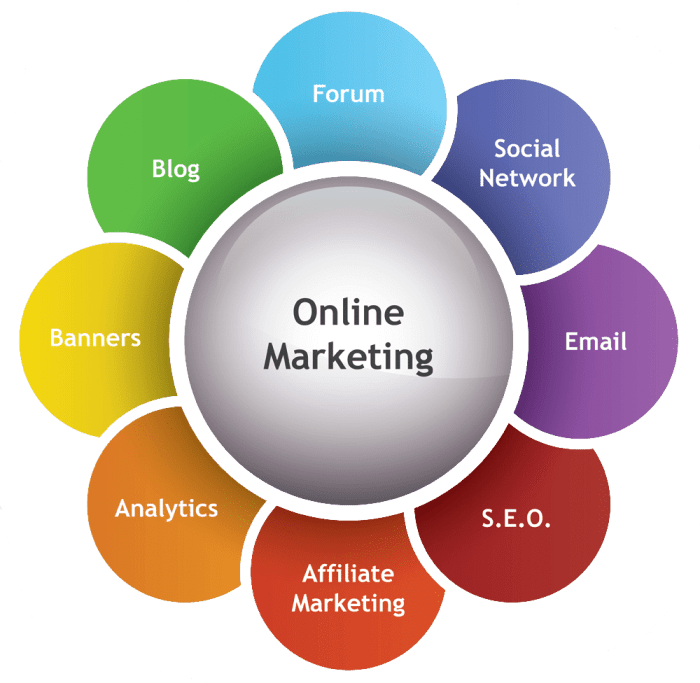Online Business Marketing takes center stage in the digital realm, where traditional strategies evolve into innovative campaigns that captivate audiences and drive success. Dive into this dynamic world with a fresh perspective, exploring key elements and strategies that define the online marketing landscape.
Introduction to Online Business Marketing

In today’s digital landscape, online business marketing plays a crucial role in reaching target audiences, driving sales, and building brand awareness. With the increasing use of the internet and social media, businesses are shifting their focus from traditional marketing strategies to online platforms to stay competitive in the market.
Evolution of Marketing Strategies
From traditional print ads and TV commercials, marketing strategies have evolved to include online channels such as social media, email marketing, search engine optimization (), and influencer partnerships. These platforms allow businesses to target specific demographics, track performance in real-time, and engage with customers on a more personal level.
Examples of Successful Online Business Marketing Campaigns
– The “Share a Coke” campaign by Coca-Cola, where personalized labels with names were printed on Coke bottles, creating a buzz on social media and driving sales.
– The “Dove Real Beauty Sketches” video campaign, which went viral on YouTube, promoting self-esteem and body positivity while showcasing Dove’s brand values.
– The “Old Spice Man” ad campaign, featuring humorous and engaging videos on social media, leading to increased brand awareness and sales.
Key Elements of a Successful Online Marketing Strategy
In the digital landscape, a successful online marketing strategy is crucial for businesses to reach their target audience and drive conversions. Let’s delve into the key elements that make up a strong online marketing strategy.
(Search Engine Optimization)
plays a vital role in improving a website’s visibility on search engines like Google. By optimizing website content, meta tags, and backlinks, businesses can rank higher in search results, increasing organic traffic and brand exposure.
Social Media Marketing
Social media platforms like Facebook, Instagram, and Twitter are powerful tools for engaging with customers and promoting products/services. Through targeted ads, influencer partnerships, and engaging content, businesses can build a loyal following and drive conversions.
Email Marketing
Email marketing remains a cost-effective way to nurture leads and retain customers. By sending personalized emails, newsletters, and promotions, businesses can stay top of mind with their audience, leading to increased brand loyalty and sales.
Content Marketing, Online Business Marketing
Content is king in the online world, and a solid content marketing strategy can set a business apart from the competition. By creating valuable and relevant content such as blogs, videos, and infographics, businesses can attract, engage, and retain customers throughout their buyer’s journey.
These key elements of , social media marketing, email marketing, and content marketing work together synergistically to create a cohesive online marketing plan that drives traffic, generates leads, and boosts sales for businesses of all sizes.
Target Audience and Market Research
Understanding the target audience is crucial in online marketing as it helps businesses tailor their strategies to reach the right people with the right message. Market research plays a key role in identifying consumer needs and preferences, allowing businesses to stay ahead of trends and deliver what customers want. Here are some tips on how to effectively target specific demographics:
Identifying Target Audience
- Utilize analytics tools to gather data on website visitors, social media followers, and email subscribers.
- Conduct surveys and focus groups to gain insights into customer behavior and preferences.
- Monitor competitors to see who they are targeting and how they are engaging with their audience.
Tailoring Marketing Strategies
- Create personalized content that resonates with different demographics, using language and imagery that appeals to their interests.
- Utilize social media targeting options to reach specific age groups, locations, and interests.
- Segment email lists based on customer preferences and behaviors to deliver targeted campaigns.
Online Marketing Tools and Platforms
In the world of online business marketing, having the right tools and platforms can make a huge difference in reaching your target audience and achieving your business goals. Let’s take a look at some popular online marketing tools and platforms that can help businesses succeed in the digital landscape.
Popular Online Marketing Tools
- Google Analytics: This powerful tool provides valuable insights into website traffic, user behavior, and conversion rates, allowing businesses to make data-driven decisions to optimize their online presence.
- SEMrush: A comprehensive marketing toolkit that offers , PPC, social media, content marketing, and competitive research tools to help businesses improve their online visibility and drive traffic.
- Hootsuite: A social media management platform that allows businesses to schedule posts, monitor social media activity, and analyze performance across multiple platforms, streamlining their social media marketing efforts.
Social Media Platforms in Online Marketing
- Facebook: With over 2 billion active users, Facebook is a key platform for businesses to engage with their audience, run targeted ads, and build brand awareness.
- Instagram: Known for its visual appeal, Instagram is ideal for businesses looking to showcase products/services, connect with influencers, and drive engagement through compelling visual content.
- LinkedIn: A professional networking platform that allows businesses to establish thought leadership, connect with industry professionals, and generate leads through targeted advertising and content sharing.
Email Marketing Platforms for Businesses
- Mailchimp: A popular email marketing platform that offers a user-friendly interface, automation features, and detailed analytics to help businesses create and manage effective email campaigns.
- Constant Contact: Known for its customizable templates, event management tools, and contact management features, Constant Contact is a reliable platform for businesses looking to engage their audience through email marketing.
- HubSpot: An all-in-one marketing platform that includes email marketing, CRM, social media management, and analytics tools, helping businesses create personalized campaigns and track performance effectively.
Content Creation and Distribution

Creating high-quality content is crucial in online marketing as it helps build credibility, engage with the audience, and drive traffic to your website. Different types of content, such as blog posts, videos, infographics, and podcasts, cater to various preferences and can attract a wider range of audiences. Effectively distributing content across various online channels ensures maximum visibility and engagement.
Types of Content
- Blog Posts: Informative articles that provide valuable insights to the audience.
- Videos: Engaging visual content that can be shared across social media platforms.
- Infographics: Visual representations of data or information that are easy to digest and share.
- Podcasts: Audio content that allows for convenient consumption on the go.
Strategies for Content Distribution
- Utilize social media platforms to share content and engage with your audience.
- Optimize content for search engines to improve visibility and reach a wider audience.
- Collaborate with influencers or other brands to expand your reach and attract new followers.
- Utilize email marketing to distribute content directly to your subscribers.